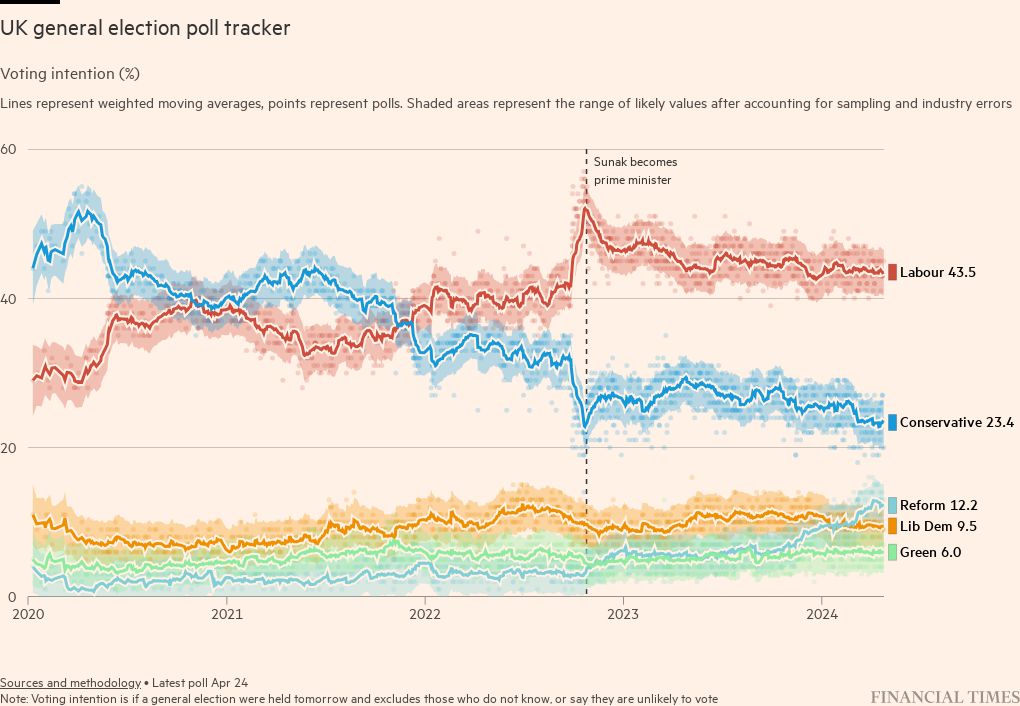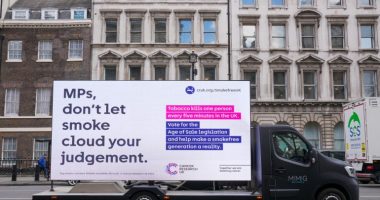Unlock the Editor’s Digest for free
Roula Khalaf, Editor of the FT, selects her favourite stories in this weekly newsletter.
Good morning. To put it plainly, the local elections were a disaster for the Conservatives. They lost almost half the council seats they were defending across England, and were defeated in nine out of the 10 metro-mayoral races, including in the new York and North Yorkshire combined authority, which includes some of the safest Conservative constituencies in the country, including Rishi Sunak’s own constituency.
Yet the prime minister says that these local elections show that the UK is on course for a hung parliament and a Keir Starmer-led government in coalition with the Liberal Democrats, Greens and SNP.
Is he right? Are we heading for a hung parliament? The short answer is no, I really don’t think so. The longer answer is below.
You can put your election questions to me and my colleagues Lucy Fisher, George Parker and Camilla Cavendish at a live webinar on Wednesday May 8 at 1pm. Inside Politics subscribers can sign up here for free.
Inside Politics is edited by Georgina Quach. Read the previous edition of the newsletter here. Please send gossip, thoughts and feedback to insidepolitics@ft.com
NEVer give up, NEVer surrender
Labour’s local election gains are the performance of an opposition party heading to Downing Street in a landslide. As I wrote in this weekend’s paper:
What the mayoral contests really show is that when the Tories can make elections a referendum on the mayoral record of Ben Houchen or Andy Street, they may do better than when voters are asked to make a straightforward choice between Labour and the Conservatives.
But as Street has learnt, even an enviable mayoral record is no shield against the presence of the word “Conservative” by your name on the ballot paper. As far as what these polls tells us about the general election, there is a simple answer: it will not be about what voters think of the mayors. It will be about what people think about the Conservative party’s platform and record, and their willingness to countenance voting for Keir Starmer and Labour as the alternative. All the evidence we have suggests that they will choose to do the latter in large numbers.
But in both the “National Equivalent Vote” and the “Projected National Share”, two different measures for projecting what share of the vote the parties would have received had elections taken place across the entire country, the gains look closer to David Cameron in 2009 than Tony Blair in 1996.
That’s the germ of truth in Sunak’s claim. The Conservative leadership’s line-to-take is that what these elections show is that the UK is heading to a hung parliament with Labour as the largest party. But it really is only a germ of truth, because in 2009 there were just 18 Green councillors elected across England, and last week there were 181. A good way to read the NEV and the PNS, historically speaking, has been to make the following assumptions:
-
Strengthen the government — at the expense of the opposition.
-
Strengthen the Labour party regardless of whether it is in government or opposition — at the expense of the Liberal Democrats.
Historically speaking, local elections become more predictive when you treat the Labour and Lib Dem votes as a shared bloc. For instance, that would dispel the mirage of Labour’s 2012 local elections, a superficially good set of results, but ones achieved on the back of Lib Dem collapse in local government, which are essentially empty calories as far as a Labour opposition is concerned.
The Green party is a new challenge — after the general election it will be screamingly obvious what the Green vote “told” us, and we will be able to apply that lesson in future elections. But this side of the general election, it isn’t wholly clear.
Now, we have to be honest: we don’t know exactly how the Green vote will behave. It seems to me a pretty safe assumption that its voters will behave fairly similarly to Labour and Lib Dem supporters at a general election, given that these parties all compete in a similar bit of the political ecosystem. Nevertheless, there will be some differences.
It seems wildly unlikely that Green voter behaviour will be sufficiently unhelpful to Labour prospects, and sufficiently helpful to Tory ones, to mean that the next election ends in anything but a Labour majority.
In addition, the neglected big story of these elections is how efficient the Labour vote has become: in our electoral system, how efficient your vote is at electing an MP really matters. In 2005, the Labour coalition was incredibly efficient, winning 286 constituencies in England with 35.5 per cent of the vote, while the Conservatives won 194 with 35.7 of the vote, and getting a comfortable majority in the Commons despite being less than 3 per cent ahead of the Tories nationwide.
In 2024, as the psephologist Lewis Baston explains over on X, Labour’s coalition is again becoming very efficient. You have to make some quite heroic assumptions about how and why that might unwind between now and January 2025, the absolute latest the election can be held, to believe that we are heading to a hung parliament or anything like one.
Now try this
This week, I mostly listened to Dua Lipa’s new record, Radical Optimism, while writing my column.
Top stories today
-
Pound a spin | Rachel Reeves will claim that Rishi Sunak is “gaslighting the British public” over the state of the economy, ahead of data expected to show that the UK has moved out of a technical recession.
-
Veteran Swinney appointed SNP leader | John Swinney is poised to become Scotland’s first minister this week after being appointed leader of the SNP. Swinney is expected to face a vote in parliament as early as today as he seeks to reunite the party and face off a rising challenge from Scottish Labour in the upcoming general election.
-
‘Our broken food system’ | Millions of people are unable to work or are less productive because they are obese, according to a report that suggests the condition helps to explain why economic inactivity rates owing to sickness in the UK are at record levels.
-
Housebuilding set to fall down | The number of new homes being built in England could drop to roughly half the official target unless the government steps up financial and policy support for new housing, according to a forecast from Savills.
Below is the Financial Times’ live-updating UK poll-of-polls, which combines voting intention surveys published by major British pollsters. Visit the FT poll-tracker page to discover our methodology and explore polling data by demographic including age, gender, region and more.
Read More: World News | Entertainment News | Celeb News
FT










